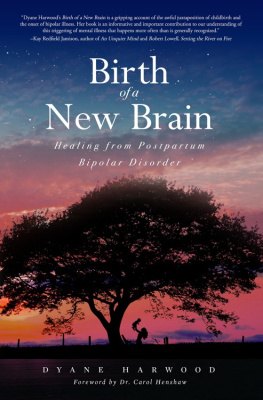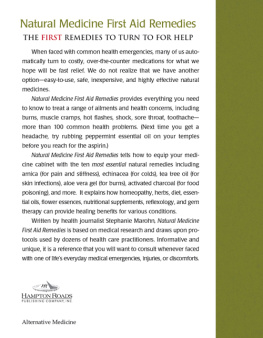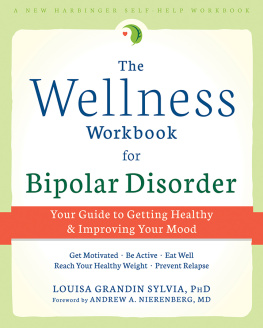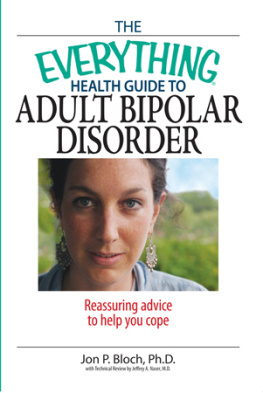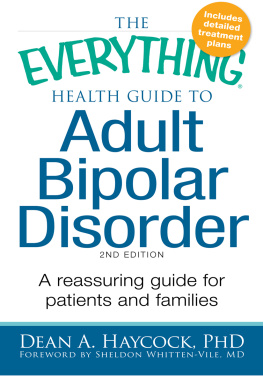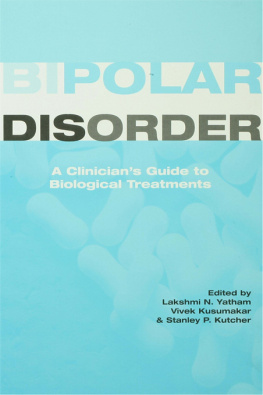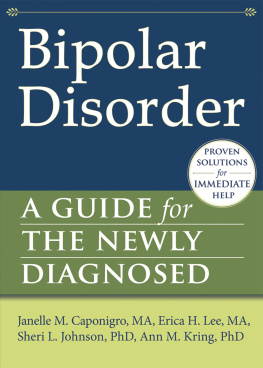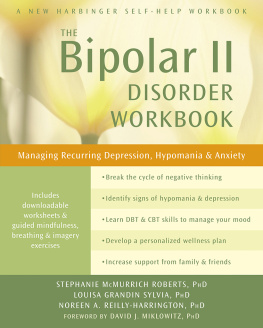
ALSO BY STEPHANIE MAROHN
Natural Medicine First Aid Remedies
Goddess Shift: Women Leading for a Change
Audacious Aging
The Natural Medicine Guide to Autism
The Natural Medicine Guide to Depression
The Natural Medicine Guide to Anxiety
The Natural Medicine Guide to Schizophrenia
The Natural Medicine Guide to Addiction

This edition first published in 2011 by
Hampton Roads Publishing Company, Inc.
Charlottesville, VA 22906
www.hamptonroadspub.com
Copyright 2003, 2011 by Stephanie Marohn
All rights reserved, including the right to reproduce this work in any form whatsoever, without permission in writing from the publisher, except for brief passages in connection with a review.
Originally published in 2003 by Hampton Roads, ISBN: 1-57174-291-3
ISBN: 978-1-57174-656-6
Library of Congress Cataloging-in-Publication Data is available upon request.
Cover design by Nita Ybarra
Typeset in Minion Pro and Clarendon with Roccoco Ornaments and Quirks
Interior art by MediClip Images 2003 Williams & Wilkins. All rights reserved.
VG
10 9 8 7 6 5 4 3 2 1
Printed on acid-free paper in the United States of America
To Virginia Woolf
CONTENTS
ACKNOWLEDGMENTS
My deep gratitude to the doctors and other healing professionals who provided information on their work for the natural medicine treatment chapters in the book. I am very appreciative of all the time and energy you so generously gave. Specifically, my thanks to:
Lina Garcia, DDS, DMD
Dietrich Klinghardt, MD, PhD
Devi S. Nambudripad, MD, DC, LAc, PhD
Judyth Reichenberg-Ullman, ND, LCSW
Julia Ross, MA, MFT
Malidoma Patrice Som, PhD
William J. Walsh, PhD
Bradford S. Weeks, MD
Gratitude also to the staff at Red Wheel Weiser/Hampton Roads. I so appreciate all your inspired work.
The information in this book is not intended to replace medical care. The author and publisher disclaim responsibility for how you choose to employ the information in this book and the results or consequences of any of the treatments covered.
INTRODUCTION
We in the United States and other countries in the developed world are in the midst of a mental health crisis. The psychiatric treatment methods we have been using are not working, as is clear from the dire statistics on mental illness. Here are just a few:
- 1 in 4 Americans aged 18 and older (26.2 percent, 57.7 million people) suffer from a diagnosable mental disorder.
- 1 in 17 (about 6 percent) suffer from a serious mental illness (serious means the mental illness interferes with major life activities).
- Mental disorders are the number one cause of disability in the United States and Canada for people in the 15 to 44 age group.
- Nearly 45 percent of people with a mental disorder meet the criteria for two or more mental disorders.
- Between 1996 and 2006, mental disorders ranked among the five most costly conditions in health care, along with heart disease, trauma-related disorders, cancer, and asthma. The largest increase in costs over these years was for mental disorders and trauma-related disorders; the expenditures for mental disorders increased from $35.2 billion to $57.5 billion. The biggest increase in the numbers of people accounting for expenditures was in mental disorders, and that number almost doubled, increasing from 19.3 million to 36.2 million people. Of these five costly conditions, mental disorders also had the highest out-of-pocket costs.
- Admissions to public psychiatric hospitals in the United States rose by 21 percent from 2002 to 2005.
A large reason why treatment of mental illness has a poor success record and is costing more all the time is that the overwhelming
After nearly three decades as a member it is with a mixture of pleasure and disappointment that I submit this letter The major reason for this action is my belief that I am actually resigning from the American Psychopharmacological Association.
At this point in history, in my view, psychiatry has been almost completely bought out by the drug companies.
We condone and promote the widespread overuse and misuse of toxic chemicals that we know have serious long term effects
While psychiatric drugs (prescription drugs used for mental illnesses) may control certain disorders, and in some instances save lives, they do not cure the disorder, and they often compound the person's problems with disturbing side effects in the short term and the risk of permanent damage in the long term. If we are going to solve the current mental health crisis, we are going to have to turn to other approaches to treatment.
The state of affairs in psychiatric treatment is reflected in the focus of quite a few of the books on mental illness aimed at the general public. The help they offer involves information for the patient on coping with hospitalization; for family members on how to live with the illness in a loved one; and on how to work with side effects of psychopharmaceuticals (psychiatric drugs)that is, what other drugs you can take to reduce those effects.
The focus of The Natural Medicine Guide to Bipolar Disorder is healing from bipolar disorder (formerly known as manic-depression and characterized by often disabling mood swings), not learning how to endure it. The book explores the contributing factors and triggers and offers a range of treatment approaches to address them and truly restore health. Only by treating underlying imbalances, rather than suppressing the symptoms as most drugs do, can lasting recovery be achieved. And only by considering the well-being of the mind and spirit as well as the body can comprehensive healing take place.
The therapies covered in this book approach the treatment of bipolar disorder in this way. They all also share the characteristic of tailoring treatment to the individual, which is another essential element for a successful outcome. No two people, even with the same diagnosis, have exactly the same imbalances causing their problems.
With the increase in the number of people who are using natural therapies, the public has become more aware of this medical approach. When many people think of natural medicine, however, they think of supplements or herbal remedies available over the counter. While these products can be highly beneficial, natural medicine is far more than that.
Natural therapies are those that operate according to holistic principles, treating the whole person rather than an isolated part or symptom and using natural treatments that do no harm and support or restore the body's natural ability to heal itself. Natural medicine involves a way of looking at healing that is dramatically different from the conventional medical model. It does not mimic that model by merely substituting a nutritional supplement for a psychiatric drug. Instead, it uses the comprehensive approach described above, which offers you the possibility of health.
Before I tell you a little about what's in the book, I have some comments about the terms mental illness and mental disorders, or brain disorders as they are more currently labeled. All of these terms reflect the disconnection between body and mindmuch less spiritin conventional medical treatment. The newer term, brain disorders, reflects the biochemical model of causality that currently dominates the medical profession.
Next page

